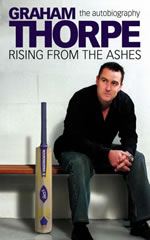Rising From the Ashes
Martyn Corrin |Published: 2005
Pages: 375
Author: Thorpe, Graham
Publisher: Collins & Wislow
Rating: 4 stars

The timing of Graham Thorpe’s book release was pretty perfect – being released during the fifth Test of last summer’s Ashes.
Whilst the general public may have only become interested on Sunday morning at Edgbaston, the cricketing public were well aware of a long running debate that had preceded the Ashes selection on July 14 – Thorpe or Pietersen? Thorpe was to miss out, of course, but the whole furore must have done his sales no harm, especially coming out in the midst of all the drama.
Many people that have read this book have criticised its lack of cricketing content. This is, perhaps, a fair criticism although it deserves an explanation. The book begins with a short introduction, and then begins in earnest in chapter two, with the words, ‘I first gave up Cricket three years ago.’
His struggles with his ex-wife do take up a large proportion of the book. However, while people may prefer if he talked simply about his career, like Flintoff does in his book, Thorpe’s struggles are important in understanding him as a cricketer, and as a person.
The book is not structured chronologically, which does have its drawbacks but it spreads the story out well. While his formative years aren’t all that interesting, he skates through it reasonably quickly, and talks of the Surrey production line that gave us Stewart, Butcher and the Hollioakes as well as himself.
Perhaps one disappointment with this book is that he does not spend as much time talking of the 1990s as a lot of fans would like. There is no great insight into what he felt of Atherton’s captaincy, although what we do learn of his experiences in the 90s, and later on, his great admiration of Brian Lara and how he feels he owes a lot of his own success to the West Indian.
It is, nonetheless, interesting to read of Thorpe’s thoughts on the achievements of the England team in the twilight of his career, and some other proud moments, including the pleasure he derived from the Karachi victory in the dark in 2000-01. He has a lot to say, though, on the renaissance of the England team under Michael Vaughan, and obviously takes great pride in being part of the start of something special. He has a lot of time and admiration for Andrew Flintoff, and seems to take some credit for aiding his development, certainly something nobody could argue with as it is something Flintoff himself says in his own book.
One comment that did make me laugh more than most reading this was how he didn’t try as hard as he could or should have on the shot that took Lara past Hayden on his way to 400 not out. He is greatly appreciative of the bat Lara signed for him, thanking him for fielding through two world records.
The most uplifting part of this book is when he makes his glorious comeback at The Oval 2003. It is the sort of stuff you can’t make up, unless, of course, you’re a South African who probably won’t take too much pleasure in reading of that defeat!
He briefly discusses Fathers 4 Justice before going on to talk of his non-selection for the Ashes. It would have been interesting to see what he would have had to say on the matter had it been written post-Ashes, but only the Lord’s Test is fitted in here so he can get no real perspective on whether he still feels the selectors got it wrong. The disappointment is clear, but it is almost an appropriate way to end a book that was very much full of ups and downs.
I can understand why purists will put this book down, if all you are after is cricket. However, I found it to be a fascinating look into the lives one of England’s most controversial sportsmen, and it is well worth a read.



Leave a comment